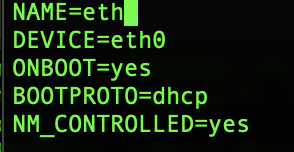SELECT COALESCE(SUM(f.voucher_value), 0) as amount
月度归档: 2019年11月
将python脚本添加为centos7服务
树莓派上做的ddns要自启动
sudo vim /usr/lib/systemd/system/myddns.service
#这里myservice.service可以定义为自己想要取的名字。
[Unit] Description=myddns Service After=multi-user.target [Service] Type=idle ExecStart=/usr/bin/python2.7 /root/hwx_aliyun_ddns/DDNS.py [Install] WantedBy=multi-user.target
更改文件权限
sudo chmod 644 /usr/lib/systemd/system/myddns.service
使配置文件生效 sudo systemctl daemon-reload #重载服务列表 sudo systemctl enable myddns.service #设置开机自启动 sudo systemctl start myddns.service #开启服务 sudo systemctl status myddns.service #查看服务是否正常运行 或者重启查看能否自启动。 reboot

centos7 设置固定ip
目前的eth0地址:
eth0: flags=4163<UP,BROADCAST,RUNNING,MULTICAST> mtu 1500 inet 192.168.101.104 netmask 255.255.255.0 broadcast 192.168.101.255 inet6 fe80::5099:46ff:fe57:603e prefixlen 64 scopeid 0x20<link> ether 52:99:46:57:60:3e txqueuelen 1000 (Ethernet) RX packets 267860 bytes 295712013 (282.0 MiB) RX errors 0 dropped 0 overruns 0 frame 0 TX packets 233105 bytes 26260005 (25.0 MiB) TX errors 0 dropped 0 overruns 0 carrier 0 collisions 0
编辑eth0的文件
vi /etc/sysconfig/network-scripts/ifcfg-eth0
修改前

修改后
NAME=eth0 DEVICE=eth0 ONBOOT=yes BOOTPROTO=static NM_CONTROLLED=yes IPADDR=192.168.101.104 NETMASK=255.255.255.0 GATEWAY=192.168.101.255
树莓派centos7安装shadowsocket
安装ss
pip install shadowsocks
创建配置文件 /etc/shadowsocks.json
{
"server": "0.0.0.0",
"server_port": 12000,
"local_address": "127.0.0.1",
"local_port": 12000,
"password": "yourpassword",
"timeout": 300,
"method": "aes-256-cfb",
"fast_open": true,
"workers": 1
}
配置自启动
[Unit] Description=Shadowsocks [Service] TimeoutStartSec=0 ExecStart=/usr/bin/ssserver -c /etc/shadowsocks.json
执行以下命令启动 shadowsocks 服务:
systemctl enable shadowsocks systemctl start shadowsocks systemctl status shadowsocks -l
最后要检查一下端口(12000)是否开放 要不然没办法使用代理
[Standard_init_linux.go:190: exec user process caused “exec format error]
You have to run the docker image that was built for a particular Architecture on a docker node that is running that same Architecture.
Take docker out of the picture for a moment. You can’t run a Linux application compiled and built on a Linux ARM machine and run it on a Linux amd64 machine. You can’t run a Linux application compiled and built on a Linux Power machine on a Linux amd64 machine.
I answered this same issue/question in this another post.
Take a look -> How much does Docker virtualize? 367
change some type campaign
(LL1000017085PJ - LL10000017094PJ and LL5000000881PJ-LL5000000PJ884) #70841,70842,70843,70844,70845,70846,70847,70848,70849,70850 select group_concat(voucher_id) from voucher where prefix='LL10' and voucher_no between 17085 and 17094 and suffix = 'PJ' #669749,669750,669751,669752 select group_concat(voucher_id) from voucher where prefix='LL50' and voucher_no between 881 and 884 and suffix = 'PJ' select * from voucher_campaign_issue where voucher_id = 669749 #23 -> 25 select * from voucher_campaign where campaign_id in (23,25) select * from voucher_campaign_issue where voucher_id in (70841,70842,70843,70844,70845,70846,70847,70848,70849,70850,669749,669750,669751,669752) select * from voucher_campaign_issue_request where request_id = 106050 select * from voucher_request_approve where request_id = 106050 select * from voucher_action where voucher_id in (70841,70842,70843,70844,70845,70846,70847,70848,70849,70850,669749,669750,669751,669752) and action_id = 30 update voucher_campaign_issue set campaign_id = 25 where voucher_id in (70841,70842,70843,70844,70845,70846,70847,70848,70849,70850,669749,669750,669751,669752); update voucher_campaign_issue_request set campaign_id = 25 where request_id = 106050 update voucher_request_approve set request_remarks = 'Citibank Internet Rewards $50 Type: Partner Redemption Expiry Date: 2020-11-22 Receipt Number: BR0009005 Ref No.: 00002036968916001,00002036968916002,00002036968916003,00002036968916006,00002036968916005,00002036968916004 Name: Jason Chua' where request_id = 106050 update voucher_action set remarks = 'Citibank Internet Rewards $50 Type: Partner Redemption Expiry Date: 2020-11-22 Receipt Number: BR0009005 Ref No.: 00002036968916001,00002036968916002,00002036968916003,00002036968916006,00002036968916005,00002036968916004 Name: Jason Chua' where voucher_id in (70841,70842,70843,70844,70845,70846,70847,70848,70849,70850,669749,669750,669751,669752) and action_id = 30;
docker ss 容器
docker run -d -p 54285:54285 oddrationale/docker-shadowsocks -s 0.0.0.0 -p 54285 -k yourpasswd -m aes-256-cfb
python后台挂起 退出不关
nohup python2 DDNS.py &
Spring 学习
一.使用正常方式
study_spring/src/applicationContext.xml
<bean name="c" class="com.how2java.pojo.Category"> <property name="name" value="category 1" /> </bean> <bean name="p" class="com.how2java.pojo.Product"> <property name="name" value="Product 1" /> <property name="category" ref="c" /> </bean>
/study_spring/src/cn/leokim/pojo/Product.java
package cn.leokim.pojo;
public class Product {
private int id;
private String name;
private Category category;
public int getId() {
return id;
}
public void setId(int id) {
this.id = id;
}
public String getName() {
return name;
}
public void setName(String name) {
this.name = name;
}
public Category getCategory(){
return category;
}
public void setCategory(Category category){
this.category = category;
}
}
study_spring/src/cn/leokom/test/TestSpring.java
package cn.leokim.pojo;
import org.springframework.context.ApplicationContext;
import org.springframework.context.support.ClassPathXmlApplicationContext;
import com.how2java.pojo.Category;
import com.how2java.pojo.Product;
public class TestSpring {
public static void main(String[] args) {
ApplicationContext context = new ClassPathXmlApplicationContext(
new String[] { "applicationContext.xml" });
// Category c = (Category) context.getBean("c");
Product p = (Product) context.getBean("p");
// System.out.println(c.getName());
System.out.println(p.getCategory().getName());
}
}
二.注解方式
study_spring/src/applicationContext.xml
<?xml version="1.0" encoding="UTF-8"?> <beans xmlns="http://www.springframework.org/schema/beans" xmlns:xsi="http://www.w3.org/2001/XMLSchema-instance" xmlns:aop="http://www.springframework.org/schema/aop" xmlns:tx="http://www.springframework.org/schema/tx" xmlns:context="http://www.springframework.org/schema/context" xsi:schemaLocation=" http://www.springframework.org/schema/beans http://www.springframework.org/schema/beans/spring-beans-3.0.xsd http://www.springframework.org/schema/aop http://www.springframework.org/schema/aop/spring-aop-3.0.xsd http://www.springframework.org/schema/tx http://www.springframework.org/schema/tx/spring-tx-3.0.xsd http://www.springframework.org/schema/context http://www.springframework.org/schema/context/spring-context-3.0.xsd"> <context:annotation-config/> <bean name="c" class="com.how2java.pojo.Category"> <property name="name" value="category 1" /> </bean> <bean name="p" class="com.how2java.pojo.Product"> <property name="name" value="Product 1" /> <!-- <property name="category" ref="c" />--> </bean> </beans>
public class Product {
private int id;
private String name;
// @Autowired
@Resource(name="c")
private Category category;
public int getId() {
return id;
}
public void setId(int id) {
this.id = id;
}
public String getName() {
return name;
}
public void setName(String name) {
this.name = name;
}
public Category getCategory(){
return category;
}
public void setCategory(Category category){
this.category = category;
}
}
注解方式还可以更简单
1.applicationContext.xml去掉之前的配置,只用一行
<context:component-scan base-package="cn.leokim.pojo"/>
2.在Category上添加注解
@Component("c")
public class Category {
3.在product上添加注解
@Component("p")
public class Product {
运行出来结果是一样的
php计算毫秒差
$start_time = microtime(true); $end_time = microtime(true); number_format($time_difference,3)